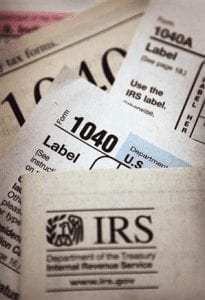The U.S. Internal Revenue Service has good news for the estimated one million U.S. citizens living in Canada who have not been filing U.S. tax returns. As of September 1, 2012, U.S. citizens can follow a new procedure called the Offshore Voluntary Disclosure Program to come clean and bring themselves into full tax compliance without massive penalties. This is important because the U.S. and Canada are moving towards sharing banking records. Once this sharing is implemented, Americans residing in Canada with Canadian bank accounts would very likely be arrested when they tried to cross the U.S. Canadian border.
 The new program requires individuals to submit three years of back tax returns, six years of bank account reporting forms (TD F 90-22.1 – Report of Foreign Bank and Financial Accounts, also known as FBARs) and a letter explaining why they haven’t filed.
The new program requires individuals to submit three years of back tax returns, six years of bank account reporting forms (TD F 90-22.1 – Report of Foreign Bank and Financial Accounts, also known as FBARs) and a letter explaining why they haven’t filed.
This procedure is only available for “low compliance risk” taxpayers – people who have simple returns and owe $1,500 or less in tax for any covered years. It is estimated that 90 per cent of Americans living in Canada will qualify for this program. If you owe a lot of tax, or have closely held partnerships, investment companies, or trusts, you may not qualify.
There is also a new “streamlined” procedure for reporting certain foreign retirement accountants, and the IRS specifically mentioned that it would apply to Canadian Registered Retirement Savings Accounts. Individuals will be allowed to retroactively elect to defer income in those accounts.
The IRS has not set an expiration date for this program but they can change its terms.
Background on IRS Move to Tax Foreign Income
The United States is unique among developed countries in requiring all citizens, including dual Canadian-Americans, to file a tax return with the IRS every year regardless of where they live. It does not matter how long you have lived in Canada, or whether you earned any U.S. income. The filing requirement applies even if you have never actually resided in the United States – which occurs when people have dual citizenship thanks to an American-born parent.
U.S. citizens are also required to list all foreign back accounts they own. Given that someone living in Canada is most likely going to have a Canadian bank account, virtually all Americans residing in Canada are in violation of U.S. tax laws unless they file an annual U.S. tax return.
Although the IRS is mostly trying to nab wealthy Americans who hide their assets offshore, this law snares many otherwise law-abiding Canadian residents who didn’t realize they had to file a 1040 tax return annually. Without this new amnesty program, Americans who haven’t filed their 1040’s could face penalties adding up to tens of thousands of dollars per year and even risk criminal prosecution.
You can visit the IRS website for more information on this program but most people will probably require professional legal or accounting assistance to figure out the right course of action.